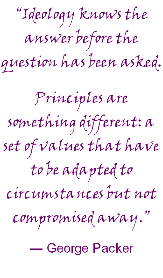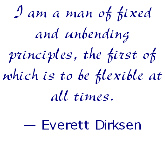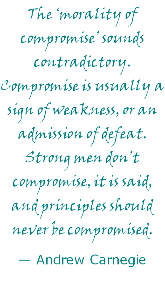




 NEXT
NEXT
 BACK
BACK

Philosophical musings on Quanta & Qualia; Materialism & Spiritualism; Science & Religion; Pragmatism & Idealism, etc.



 Recent Posts
Recent Posts
Post 2. October 29, 2017
Why Compromise?
Like the philosophy of Pragmatism, the BothAnd principle, requiring accommodation to seemingly extraneous factors, could be dismissed as a weak policy of compromising eternal principles for temporary goals. But that sneer misses the point of taking the broader view, seeking harmony & balance instead of victory & triumph. So, the idea is to make practical concessions to the fact that each person, social group, nation, planet, and galaxy is but a small part of a greater whole. For example, the universe, as a cosmos of chaotic elements is held together only by mutual attraction of physical and social forces. Any change in a part affects the whole, and is in turn affected by the whole. Therefore, unless you are master-
For momentary convenience, the complexities of the world are often simplified into conceptual Black versus White, Good versus Evil categories. But in reality, it’s never that simplistic. The world is actually a continuum, which can be described mathematically by a Bell Curve, with most instances in the middle, and only a few at the tail ends. Which means that the balance point of harmony is in the “average” center of mass. The ancient Greek philosopher Aristotle defined moral virtue as a disposition to behave optimally, not perfectly or absolutely, by following a middle path between vicious extremes of deficiency and excess : the Golden Mean. Hence, the BothAnd principle is more like the positive “adaptation” of evolution than the distasteful “compromise” of partisan politics.
In order to reach any objective, despite obstacles, we must always be willing to compromise on minor details in order to achieve the greater good. Compromise is a reasonable strategy of foregoing a perfect solution to a problem in order to achieve a practical solution. Many negotiations founder upon the stubbornness of ambitious men, or the self-
The BothAnd principle of complementarity assumes that, in most cases of interpersonal relations, conciliation & compromise is better than conflict and chaos. As symbolized in the harmonious Yin/Yang symbol, the black or white halves would struggle for supremacy if not for the restraint of the encircling holistic power of the whole, like gravity pulling all toward the center. The art of compromise seeks win/win solutions instead of win/lose domination.
End of Blog Post 2








